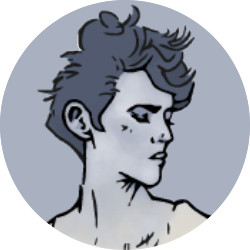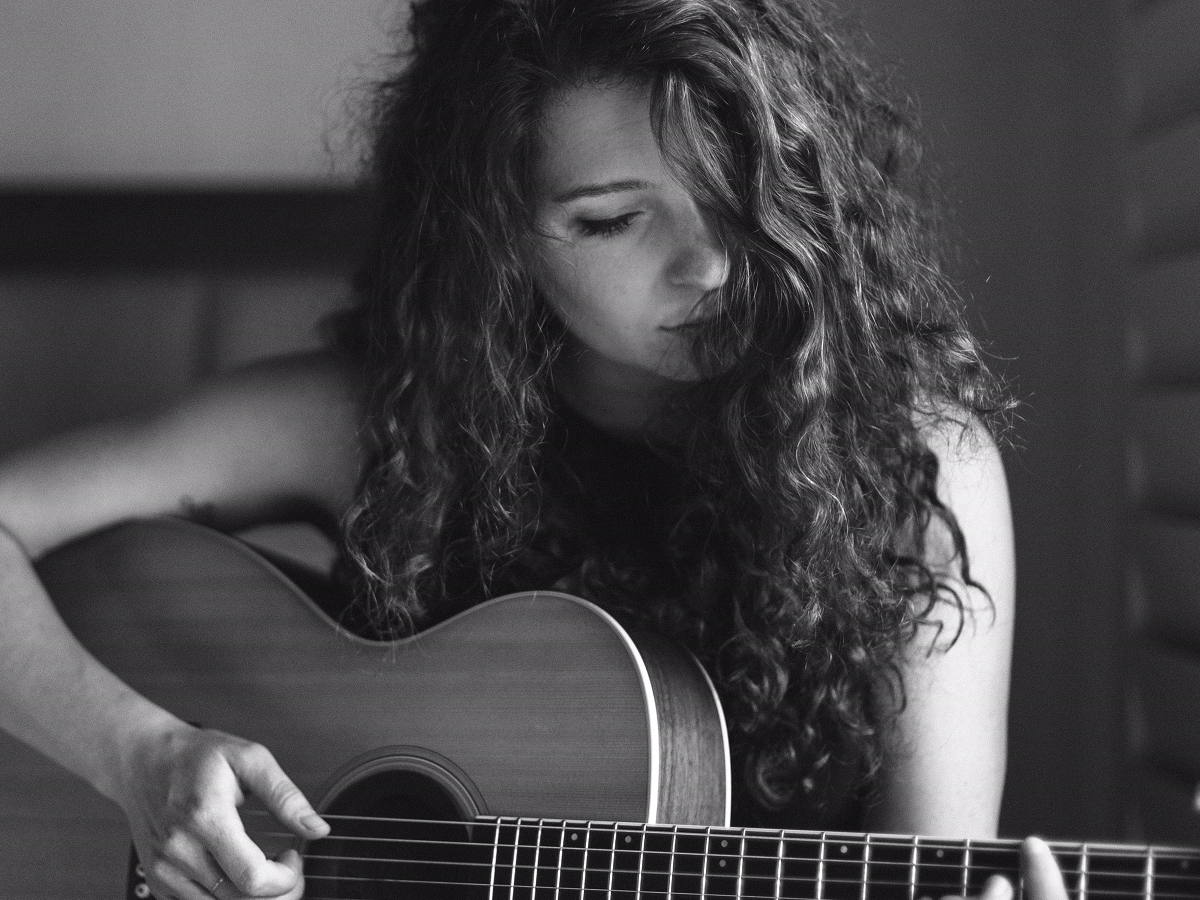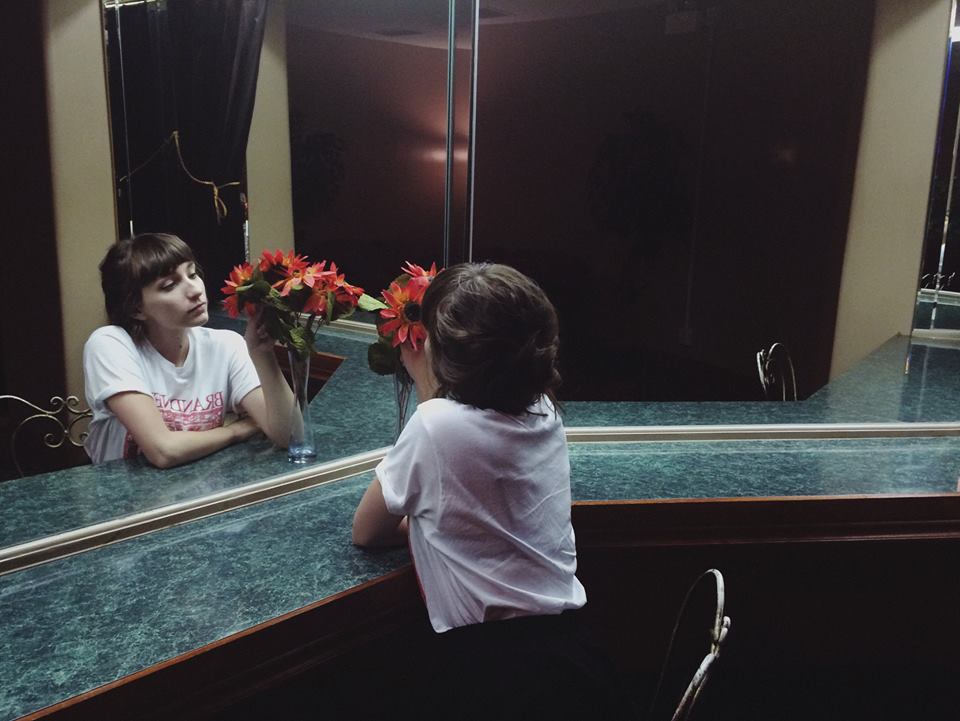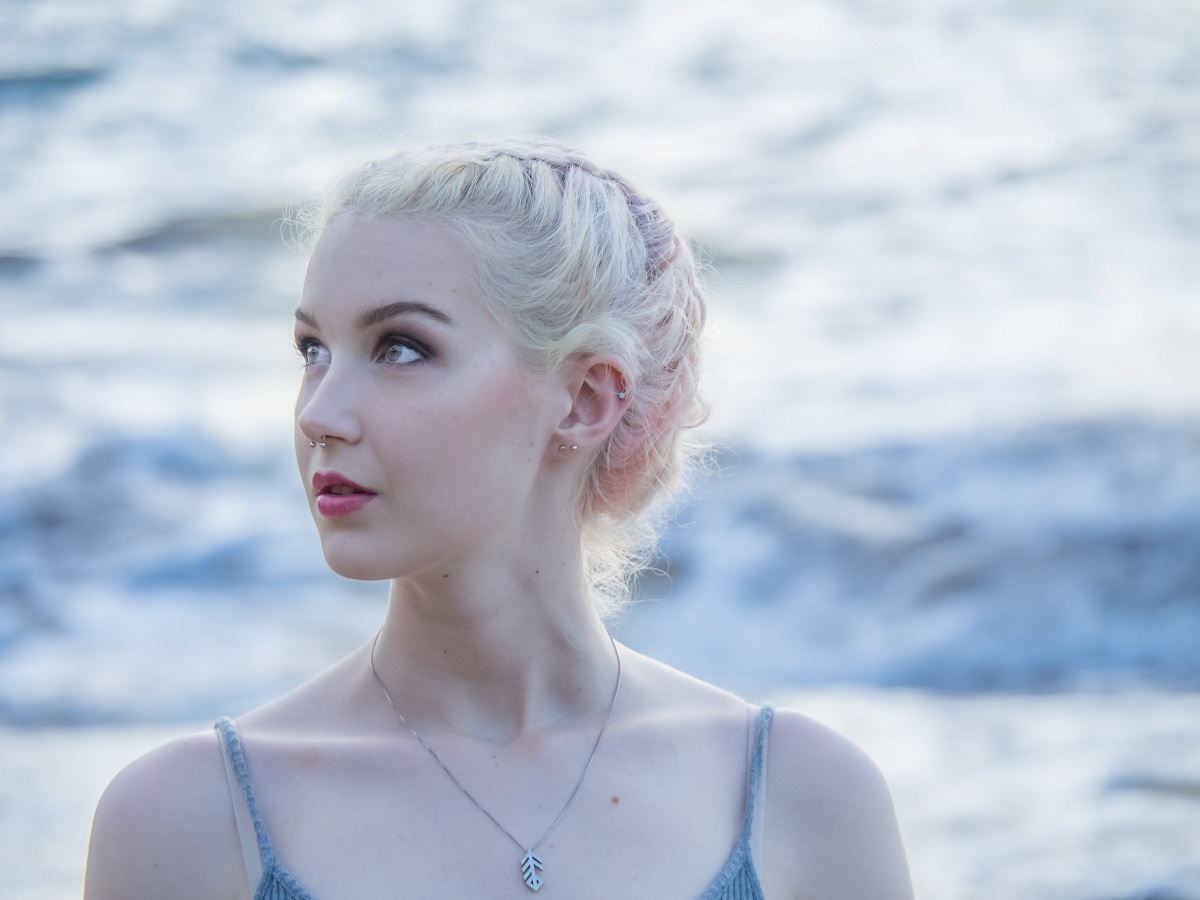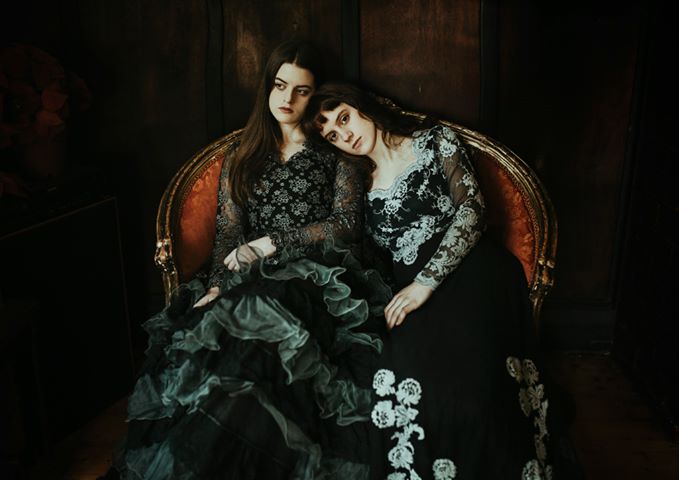 Photo credit: Emma McEvoy
Photo credit: Emma McEvoy
The Interview
What was it that initially inspired you both to start making music and writing songs?
Mabel: Well, I’m older – I’m eighteen and Ivy’s fifteen — so I was the one who started writing first. We’d been in a band beforehand — Ivy and I, and a friend — we were called the Highway Sisters. We did the O Brother, Where Art Thou? soundtrack, which is like Americana and Appalachian folk songs. That was all three-part harmonies, no instruments. But then, at the end of grade six, my teacher said, “Why don’t you guys write a song for an end of year CD?” I picked up a guitar — I’d never played guitar before, but I’d been playing cello since I was eight, so it came really easily for me — and I wrote my first song, which was about my teacher and how it was sad that I was gonna be leaving him and going off on this journey in high school.
I also found out that First Aid Kit made their first CD when they were about sixteen, and I was like, “If they can do it, why can’t I?” So, I started writing my own songs when I was twelve, and they kept coming. Ivy jumped on board, and because we’d been singing a lot of harmonies since we were very young, as a family as well as at school, she was really good at harmonies.
How far removed do you feel from that early inspiration?
Mabel: I think we have moved on. First Aid Kit was our major inspiration — we went busking on the streets and just played every single First Aid Kit song. They had three albums out and we played them all in order from the start to the end [laughs]. We knew them all off by heart. But now we have a lot more influences.
Ivy: More influences for production: Sufjan Stevens, Agnes Obel.
Mabel: Sufjan Stevens as an influence — he’s very experimental with all his arranging, which we’re really inspired by. The kind of cinematic style of arranging. Carrie and Lowell is a really great album about the death of his mother, and it’s really, really sad, but really, really beautiful. I think it’s similar to our music in that way — since Ivy’s friend passed away two years ago, we’ve written a lot of songs about grief. Celtic music is also one of our influences. When we were kids, we listened to a lot of Celtic music at home, and we both play string instruments.
Ivy: I play Celtic fiddle, Irish — all that sort of stuff. I don’t like classical — I only play traditional Scottish, Irish and Celtic instruments.
Mabel: Yeah, and then I play cello, so that’s like our other project. At home we like to play our stringed instruments in the Celtic style, and I think that feeds into our music for Charm of Finches as well.
Is that something you’d like to develop further as you move forwards?
Mabel: Yeah, I think so. I mean, Ivy doesn’t play that much fiddle at the moment. So, I guess so.
Has your perception of Charm of Finches changed as you’ve gotten a little older?
Mabel: I don’t think our perception’s changed. I think we’ve changed. We still see ourselves as a folk sister duo.
So, what is your songwriting process?
Mabel: For me, my songs are often triggered by an emotion, an event, or something I’ve observed in someone else. From that initial spark, I’ll probably take my guitar first and find a nice chord progression that suits the mood of the song or whatever I’m trying to convey, and then trial lyrics over it. I’ll often record that on my phone and pick out the good bits.
We’ve used a couple of different methods in the past. Sometimes we record a chord progression that we wanna put a song to…
Ivy: … and then we loop it and just have a stream of poetry. For one song we used a book.
Mabel: We were writing a song about grief at the time — this was after Ivy’s friend passed away. I’d been reading a book called Kitchen, by Banana Yoshimoto, which is a really, really beautiful book but it’s really, really sad. We picked a random page and picked our favourite phrases from the page, used them as a gateway into the song, and then just made heaps of stream of consciousness writing from that.
And how easy do you find it to share songwriting duties?
Mabel: It varies, because sometimes I start a song, and then I go, “I can’t finish this song, Ivy!” and she’ll give me some help. But then sometimes we write them together.
Ivy: I think it’s also quite good that we’re sisters, because we’re not afraid to criticise and be really blunt, like, “No, that’s terrible! Or yeah, that’s great!” That helps a lot. When Mabel used to write a lot of the songs, she’d finish the song and then I’d add my harmonies to it, but now we do a lot more collaborating with songwriting.
Do you connect quite quickly with each other’s ideas?
Mabel: Yeah, I think so. We’re a similar age, and Ivy’s kinda got the same friend groups as me. She was supposed to be in year ten this year, but she skipped a year because we wanted to go touring overseas.
Ivy: [laughs]
Mabel: Our school was just like, “Okay, that’s fine.” So now she’s in year eleven and we share a lot of the same friend groups. I think we have a similar outlook on life or on our experiences. We’re quite on the same page.
When you are touring, does it feel normal to you? Or does it feel strange to be away from school life?
Mabel: I don’t think it feels strange. It’s often hard to juggle. I think our life as a band is like this separate life from our life as students at school, but sometimes those have to come together. We have homework that we need to get done, and we’re driving to Sydney or something, and sometimes we have to do work in the car, which is annoying — and you don’t normally get that much work done [laughs].
So do you feel distant from other people of your ages who are living a conventional school life?
Mabel: A little bit. Sometimes I forget that I’m a student. When we’re doing a really great gig or something… There’s some gigs where we go, “Wow, how are we doing this?” When we opened for an artist called Kasey Chambers, who’d been a really big influence on our music when we were very little. We knew all the words to her songs, and we’d sung her songs when we were busking at eight and eleven. We ended up opening for her at this festival on this big stage, and I was a bit like, “This is crazy!”
And people often do say, “How do you do both — doing all these gigs and school?” Yeah, it does get hard.
Returning to the songwriting: Is there a particular mood you tend to be in when you write?
Ivy: We write more sad, melancholic songs rather than happy songs.
Mabel: I think when you’re happy, you wanna be in the moment, but when you’re sad, it’s a lot more reflective. Maybe you’ll be on your own in your room and feeling a bit upset — you wanna express it in some way. If you’re happy, maybe you’re spending your time with other people, which is not really where you write songs, generally.
Is there anything in particular you do to stimulate your own creativity?
Mabel: For me, it’s just stream of consciousness writing. If I have something that is hard to express in words, or just a raw feeling that doesn’t have any sort of rational element to it, I’ll try and express it through poetry. Because it’s nothing until you put it down somewhere — it’ll just stay there. It’ll be like a pent-up feeling until you put it on a page and see what happens with it.
Another thing I like to do is paint. That’s my other creative output.
On a similar note: You’ve just released quite a conceptual video for your new single — how big a role do visuals play whilst you’re writing?
Mabel: That’s interesting. I don’t think we have a visual in mind when we write songs. Maybe if it’s a story song it has a visual connection.
Ivy: One song I can think of that has a visual is Paper and Ink. We were inspired by a vase of flowers.
Mabel: We kinda just made the story of the song around the vase of flowers. There were some flowers that my grandma gave to me, and we changed it to a mysterious lover for the sake of the song to spice it up a bit [laughs]. So that became the centrepiece of the song and a reoccurring thread throughout it to tie it together.
How do you keep yourself interested in your art when the initial high of inspiration or a particularly memorable show wears off?
Mabel: I guess, trying new things. Especially, I think, being performers as well as songwriters, we’re performing the same songs at every gig — there are some songs that we play every single show. After a while, it’s hard to connect with them, which is a big challenge. So, we love to play new songs — they’re the most exciting thing. Sometimes we have little challenges: “We’ve gotta get this song done for this gig.” Which is a way of keeping things interesting.
I think also trying new songwriting techniques and new sounds. New instrument combinations.
Ivy: Yeah, that’s the big one.
Mabel: We have a lot of different instruments that we play on stage. I mostly play guitar, but I sometimes play ukulele.
Ivy: And I play violin, a little bit of glockenspiel, and banjo.
Mabel: So we have a lot of different instruments that we can do different combinations with. If we have a new song, we’ll try out a different combination.
Are there any instruments you haven’t used yet that you would like to implement in some way?
Mabel: Probably. It’s hard to fit them all in the car at this point [laughs]. I get really excited playing new instruments.
Ivy: We have one song on piano. Whenever there’s a piano at a venue, or it’s a special show and we can borrow someone’s piano and it won’t be too much of a hassle, we always get really excited about playing that song because we don’t play it that often.
Mabel: I also play cello, which I don’t play on stage. It’s a big instrument, so it is kind of a hassle to bring around. I play it in all the recordings, and I think, in the recordings, we get very experimental with new instruments. Which is always really fun: arranging all the different parts.
Since the last single and the last album were both very much studio albums, they had a lot of overdubs and stuff. We composed all the parts ourselves, and we had a hammered dulcimer in it. I was listening to Sufjan Stevens and I was like, “What is that sound! It’s really, really cool.” And it was a hammered dulcimer. We were like, “Let’s put that in one of our songs!” So, we found out one of our friends just happened to have a hammered dulcimer, so we drove out to his place in the country.
We will probably just keep bringing in more instruments into our recordings.
This talk of lesser used instruments reminds me, unfortunately, of a seemingly never-ending show I was at last year. One of the prime forms of instrumentation throughout the hour plus duration was a kazoo, which was played loudly and with extraordinary enthusiasm. I was blocked in and unable to leave. It was horrifying.
Mabel: Oh, no! [laughs] I don’t think that’s in our future.
Ivy: [laughs] Noooo! [laughs]
Mabel: Unless we both have an early mid-life crisis. Imagine that: kazooing in harmony [laughs].
Ha! So what do you feel is the most important element of any song that you write?
Mabel: Probably the lyrics. I think all parts of the song kinda work hand in hand. One of my songwriting mentors — my friend Charles Jenkins, who’s a very respected songwriter here in Melbourne — talks about how all the elements of a song have to be together. He calls it a car. They’ve all got to be in the car. The lyrics, the melody, the rhythm, the overall mood of the song — it needs to all be sitting in that one car and driving in the same direction to make a really great song. I think that’s really important but, for me, I really love a song with great lyrics — if the lyrics aren’t good, I think it wrecks the song. So yeah, the poetry of it, the originality of the lyrics. And the song has got to trigger something in you to make you feel a certain way, and I think the lyrics play a big part in that.
Is there anything that irritates or frustrates you about the style of music that you make?
Mabel: Well, folk music is a very broad genre, which is nice because we have a bit of wriggle room. Whilst we define ourselves as that genre, we have space to experiment, which I really like. What I really admire in Sufjan Stevens is the way he’s quite folky but also has electronic elements to his music. I think what irritates me is that when you say you’re a folk musician, you’re expected not to have electronic sounds. I love Sufjan’s music, and the electronic sounds that he uses are kind of organic — they’re very soft and work really well with the folky style. We have a little bit of a synth sound in the back of one of our songs, but we don’t tell anyone that because…
Ivy: You just did! [laughs]
Mabel: Well, we won’t say what song it is [laughs]. Because if you say, “We’re folk muso’s, but there’s a bit of a synth in one of the songs”, it’s like, “Oh, that’s not supposed to be in folk music.”
Ivy: It’s really categorised, I feel.
Mabel: But I think artists these days are breaking the boundaries more and more and meshing different styles together — I love music that does that.
Being so young when you started out, have you ever felt as though your ages have perhaps unfairly coloured people’s perceptions of your music?
Mabel: Definitely [laughs]. We often get people being quite condescending to us.
Ivy: At gigs, the sound engineer — just very condescending. We’ve had that quite a lot.
Mabel: And people who say, “Oh, you’re good for your age.” Backhanded compliments, often. Just because we’re young, I think people’s immediate reaction is: they’re young, so they’ve got to be improving — “You’ll be good in the future”, sort of thing. “You’re working up to something.” I get annoyed because I want them to see who we are right now rather than young people who have got to progress to something bigger in the future.
Do you also perhaps feel then that it might be quite difficult to shake some of that off — that because people know you started so young, they’ll forever see you as such?
Mabel: Maybe, yeah.
Ivy: Yeah, I’ve never thought about that actually.
Mabel: I think being young has worked both ways for us. It’s set us apart, for the good and for the bad.
How welcoming has the Australian music community been to you both?
Mabel: I think they’ve been really quite nice. We’ve done a lot of music festivals around Australia, and they’ve all been really lovely and encouraging.
Ivy: Yeah, especially the festivals, like the National Folk Festival in Canberra.
Mabel: I think folk festivals are the best, because they’re all music lovers and they’re their for the music, whereas in maybe the more commercial music scene, it’s about the persona — it’s less about the music and more about the shtick and look.
It’s all about image, isn’t it: having something to post on Instagram.
Mabel: Yeah, totally. You totally get that. We haven’t been to many more-commercial concerts, but they’ve all got their phones out. Often you can hardly see the performer, and the sound isn’t very good because it’s in this huge stadium, whereas at folk festivals, it’s a lot more intimate — you get a more personal connection with your listeners and it’s a lot more real. Which really suits the way our music is, because it’s often really personal and you’ve got to really listen to the lyrics and understand the story. It’s not a pop ditty that you dance to far away from the performer.
Do you prefer playing more intimate venues then?
Ivy: Yeah.
Mabel: Yeah, I think big venues are fun, definitely, and those big concerts that we have played have been awesome, but I think that, for our music, a more intimate setting serves the delivery of the songs better.
Talking of delivery, specifically the vocals, I find it interesting that you both seem to really embrace your accents when you sing, which is something I’ve been told Australian-accented vocalists can be quite wary of doing.
Mabel: Well, I’ve noticed that we’ve been increasingly more Australian. I think it’s to do, perhaps, with finding our own voice.
Ivy: It’s not like a choice that we made, I don’t think.
Mabel: No, not consciously. I listen to the first recordings that we made, and I’m sort of singing like Klara from First Aid Kit. And some of the words had got an American accent, because I hadn’t yet found my own voice as a singer. So, I was just going from what my influences were.
That totally changed when we started writing our own songs, because they were our own words. I think we’re more sure of who we are as an artist and what our sound is, rather than copying from anyone. I think now, we’ve developed to a point where our sound is very much our own, and our influences all come together on a more subconscious level, I guess — they’re their, but they’re not so present or noticeable.
Okay, so you recently released your latest single – The Bridge. What differences do you see between it, and the songs you released a couple of years ago on Staring at the Starry Ceiling?
Mabel: There are definitely changes in the way we recorded it. We’re a lot more picky, and very thorough in the recording process — we wanted to get the best of everything — whereas, our last album, we recorded both vocals and guitar in the one room together, and we really wanted to capture the sort of energy we create when we play live. For this song, we did everything separately to get a really slick sounding recording, more refined.
Is there anything that you specifically hope to communicate to people through your work?
Mabel: I think what I want is for people to be able to relate to our songs. Because we’re young, our songs can talk to a younger audience.
Ivy: There are still a lot of young musicians, but not as many, so there aren’t that many songs written about the experiences of a young person…
Mabel: … Immediate experiences, I think. While a lot of people reflect back on their teenage years, there’s not as many teenagers talking about their experiences at that point in time. But I do think, at the same time, our songs are quite universal, and I think they can speak to a wider audience as well. We’ve had audience members of all ages tell us how much they related to our songs. Especially the really honest ones — especially the ones about grief — because it’s a topic that people don’t really talk about. Maybe it’s hard to express, and our songs are a way of expressing that. For someone who can’t express how they’re feeling, maybe a song can speak for them, and maybe that will help. I hope.
How does that affect the both of you: writing songs about grief and then having to perform them again and again?
Ivy: It has been hard. A lot of the times, I’ve been particularly emotional at that point when I’m singing the song.
Mabel: Would you say that singing a song about your grief is a healthy way of dealing with intense feelings like that?
Ivy: Yeah.
Finally, to what extent would you like your creative output to define you as people?
Mabel: I don’t mind. I’m proud of the songs that I’ve written, and because my songs are so personal — a lot of them are autobiographical — I don’t mind that. It’s different though with recording, because recordings are capturing something of the past, which is not what we are in the present. Sometimes we don’t like people listening to the recordings, because they’re not that great and don’t show who we are at this very moment.
But I don’t mind my songs speaking for who I am or who I have been. I’m proud of them, and I like to share them with people — that’s why we play music.
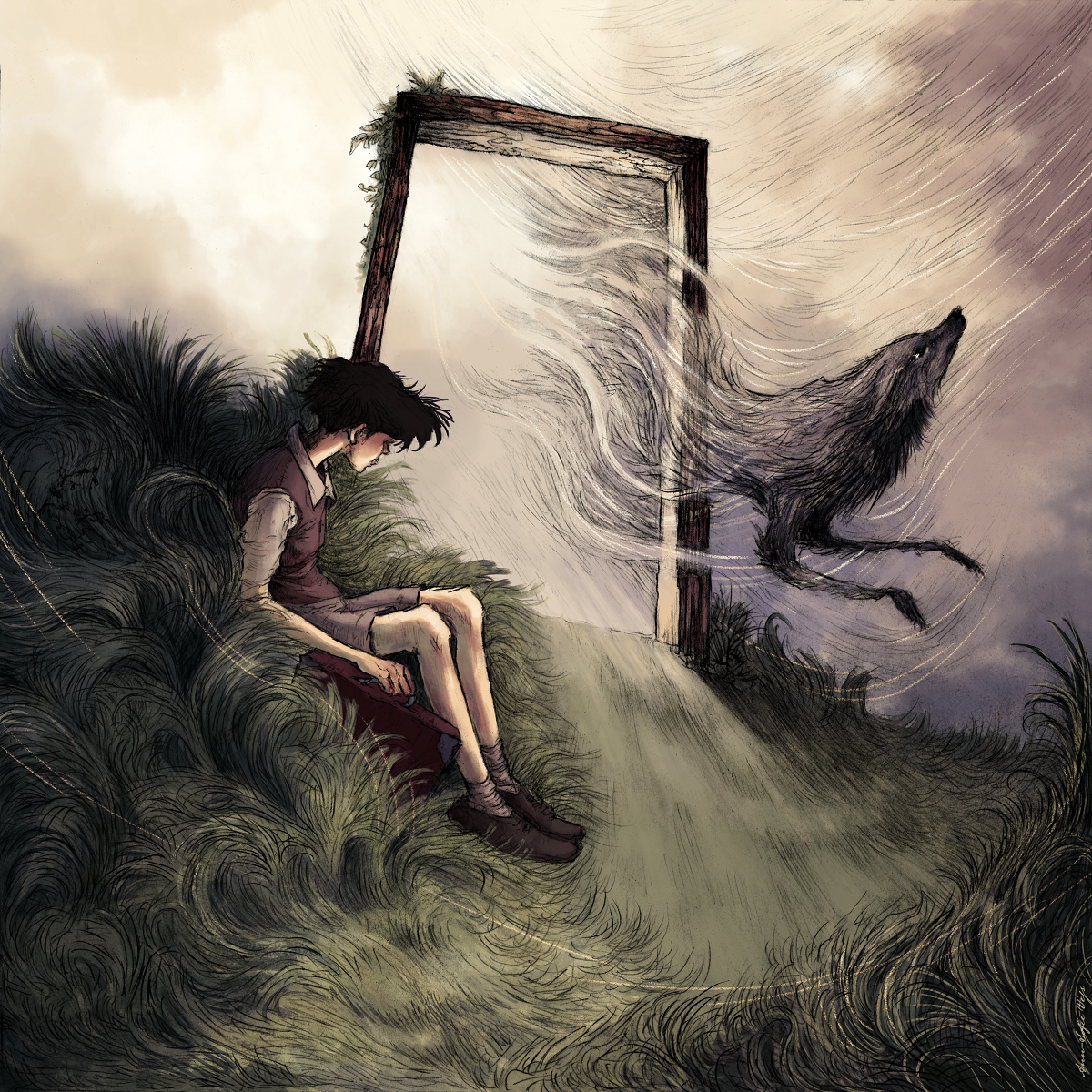 Charm of Finches featured onBeautiful Songwriting 6
Charm of Finches featured onBeautiful Songwriting 6Hear more from the band on Bandcamp, and keep up to speed with their latest news on Facebook and Instagram.
If you enjoyed reading this interview and happen to think we're doing something right, please consider sharing the link -- whether on social media, or just with a friend, it'd really help us out! We're also on Facebook, Instagram (@alonelyghostburning) and Twitter, so if you'd like to keep up-to-date with the publication of new content, and also provide us with a whole heap of motivation, please do give us a like or follow.
